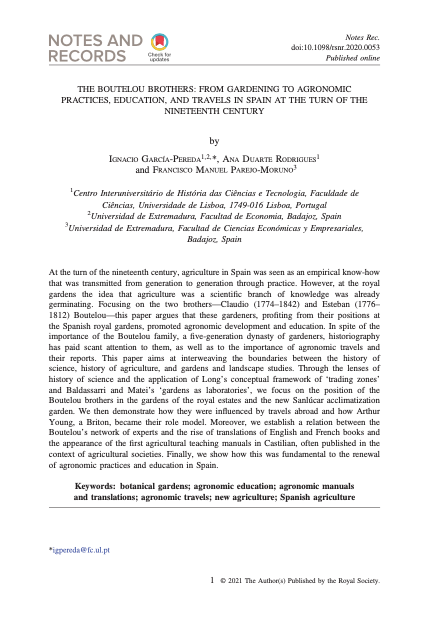The Boutelou Brothers: From Gardening to Agronomic Practices, Education, and Travels in Spain at the Turn of the Nineteenth Century
- Author(s)
Ignacio García-Pereda, Ana Duarte Rodrigues and Francisco Manuel Parejo-Moruno
- Year
- 2021
- Journal
Notes and Records: the Royal Society Journal of the History of Science

abstract
At the turn of the nineteenth century, agriculture in Spain was seen as an empirical know-how that was transmitted from generation to generation through practice. However, at the royal gardens the idea that agriculture was a scientific branch of knowledge was already germinating. Focusing on the two brothers—Claudio (1774–1842) and Esteban (1776–1812) Boutelou—this paper argues that these gardeners, profiting from their positions at the Spanish royal gardens, promoted agronomic development and education. In spite of the importance of the Boutelou family, a five-generation dynasty of gardeners, historiography has paid scant attention to them, as well as to the importance of agronomic travels and their reports. This paper aims at interweaving the boundaries between the history of science, history of agriculture, and gardens and landscape studies. Through the lenses of history of science and the application of Long's conceptual framework of ‘trading zones’ and Baldassarri and Matei's ‘gardens as laboratories’, we focus on the position of the Boutelou brothers in the gardens of the royal estates and the new Sanlúcar acclimatization garden. We then demonstrate how they were influenced by travels abroad and how Arthur Young, a Briton, became their role model. Moreover, we establish a relation between the Boutelou's network of experts and the rise of translations of English and French books and the appearance of the first agricultural teaching manuals in Castilian, often published in the context of agricultural societies. Finally, we show how this was fundamental to the renewal of agronomic practices and education in Spain.